Description
It's not impossible, but rather difficult and the expression will really start to get out of hand. Take this 2831 character monster which:
- validates a number with exponent will expand to an integer
- requires a number to be in
123.456e7890 or 1234.678e1,234,567
- if the exponent contains commas they must appear in the correct comma delimited three digit groupings
- supports only numbers upto 99 places after the decimal point
As written here it does require the use of the x option which will ignore white space and comments. The expression could be shortened to about 2041 by replacing the [eE] with e and using the i option; and [0-9] with \d however this will slightly reduce performance because \d class contains all unicode characters and not just 0-9.
^
(?=.*?[eE][0-9]{1,3}(?:,[0-9]{3})*|[0-9]*$) # validate commas are in the correct order
(?=[0-9]+\. # match the integer portion of a real number
(?=
[0-9]{1,99}[eE][1-9](?:,?[0-9]){2,}
|[0-9]{1,9}[eE][1-9],?[0-9]
|[0-9]{10,19}[eE][2-9],?[0-9]
|[0-9]{20,29}[eE][3-9],?[0-9]
|[0-9]{30,39}[eE][4-9],?[0-9]
|[0-9]{40,49}[eE][5-9],?[0-9]
|[0-9]{50,59}[eE][6-9],?[0-9]
|[0-9]{60,69}[eE][7-9],?[0-9]
|[0-9]{70,79}[eE][89],?[0-9]
|[0-9]{80,89}[eE][9],?[0-9]
|[0-9]{90,99}[eE][1-9],?[0-9]
|(?=[0-9]{90}(?=.*?[eE]9)(?:[eE].,?[0-9]|[0-9]{1}[eE].,?[1-9]|[0-9]{2}[eE].,?[2-9]|[0-9]{3}[eE].,?[3-9]|[0-9]{4}[eE].,?[4-9]|[0-9]{5}[eE].,?[5-9]|[0-9]{6}[eE].,?[6-9]|[0-9]{7}[eE].,?[7-9]|[0-9]{8}[eE].,?[89]|[0-9]{9}[eE].,?9))
|(?=[0-9]{80}(?=.*?[eE]8)(?:[eE].,?[0-9]|[0-9]{1}[eE].,?[1-9]|[0-9]{2}[eE].,?[2-9]|[0-9]{3}[eE].,?[3-9]|[0-9]{4}[eE].,?[4-9]|[0-9]{5}[eE].,?[5-9]|[0-9]{6}[eE].,?[6-9]|[0-9]{7}[eE].,?[7-9]|[0-9]{8}[eE].,?[89]|[0-9]{9}[eE].,?9))
|(?=[0-9]{70}(?=.*?[eE]7)(?:[eE].,?[0-9]|[0-9]{1}[eE].,?[1-9]|[0-9]{2}[eE].,?[2-9]|[0-9]{3}[eE].,?[3-9]|[0-9]{4}[eE].,?[4-9]|[0-9]{5}[eE].,?[5-9]|[0-9]{6}[eE].,?[6-9]|[0-9]{7}[eE].,?[7-9]|[0-9]{8}[eE].,?[89]|[0-9]{9}[eE].,?9))
|(?=[0-9]{60}(?=.*?[eE]6)(?:[eE].,?[0-9]|[0-9]{1}[eE].,?[1-9]|[0-9]{2}[eE].,?[2-9]|[0-9]{3}[eE].,?[3-9]|[0-9]{4}[eE].,?[4-9]|[0-9]{5}[eE].,?[5-9]|[0-9]{6}[eE].,?[6-9]|[0-9]{7}[eE].,?[7-9]|[0-9]{8}[eE].,?[89]|[0-9]{9}[eE].,?9))
|(?=[0-9]{50}(?=.*?[eE]5)(?:[eE].,?[0-9]|[0-9]{1}[eE].,?[1-9]|[0-9]{2}[eE].,?[2-9]|[0-9]{3}[eE].,?[3-9]|[0-9]{4}[eE].,?[4-9]|[0-9]{5}[eE].,?[5-9]|[0-9]{6}[eE].,?[6-9]|[0-9]{7}[eE].,?[7-9]|[0-9]{8}[eE].,?[89]|[0-9]{9}[eE].,?9))
|(?=[0-9]{40}(?=.*?[eE]4)(?:[eE].,?[0-9]|[0-9]{1}[eE].,?[1-9]|[0-9]{2}[eE].,?[2-9]|[0-9]{3}[eE].,?[3-9]|[0-9]{4}[eE].,?[4-9]|[0-9]{5}[eE].,?[5-9]|[0-9]{6}[eE].,?[6-9]|[0-9]{7}[eE].,?[7-9]|[0-9]{8}[eE].,?[89]|[0-9]{9}[eE].,?9))
|(?=[0-9]{30}(?=.*?[eE]3)(?:[eE].,?[0-9]|[0-9]{1}[eE].,?[1-9]|[0-9]{2}[eE].,?[2-9]|[0-9]{3}[eE].,?[3-9]|[0-9]{4}[eE].,?[4-9]|[0-9]{5}[eE].,?[5-9]|[0-9]{6}[eE].,?[6-9]|[0-9]{7}[eE].,?[7-9]|[0-9]{8}[eE].,?[89]|[0-9]{9}[eE].,?9))
|(?=[0-9]{20}(?=.*?[eE]2)(?:[eE].,?[0-9]|[0-9]{1}[eE].,?[1-9]|[0-9]{2}[eE].,?[2-9]|[0-9]{3}[eE].,?[3-9]|[0-9]{4}[eE].,?[4-9]|[0-9]{5}[eE].,?[5-9]|[0-9]{6}[eE].,?[6-9]|[0-9]{7}[eE].,?[7-9]|[0-9]{8}[eE].,?[89]|[0-9]{9}[eE].,?9))
|(?=[0-9]{10}(?=.*?[eE]1)(?:[eE].,?[0-9]|[0-9]{1}[eE].,?[1-9]|[0-9]{2}[eE].,?[2-9]|[0-9]{3}[eE].,?[3-9]|[0-9]{4}[eE].,?[4-9]|[0-9]{5}[eE].,?[5-9]|[0-9]{6}[eE].,?[6-9]|[0-9]{7}[eE].,?[7-9]|[0-9]{8}[eE].,?[89]|[0-9]{9}[eE].,?9))
|(?:[eE][0-9]|[0-9]{1}[eE][1-9]|[0-9]{2}[eE][2-9]|[0-9]{3}[eE][3-9]|[0-9]{4}[eE][4-9]|[0-9]{5}[eE][5-9]|[0-9]{6}[eE][6-9]|[0-9]{7}[eE][7-9]|[0-9]{8}[eE][89]|[0-9]{9}[eE]9)
)
|(?=[0-9]+[eE]) # integers
)
[+-]?
([0-9]*\.?[0-9]+|[0-9]+\.?[0-9]*)
[eE][+]?((?:,?[0-9]+)+)
As written here the expression uses the x option which ignores white space
Example
Sample Text
1.2334576E34
1.23E4
1.2334576E34
122E3,123,456
1.234
1.234E2
Matches
[0] => 1.2334576E34
[1] => 1.23E4
[2] => 1.2334576E34
[3] => 122E3,123,456

